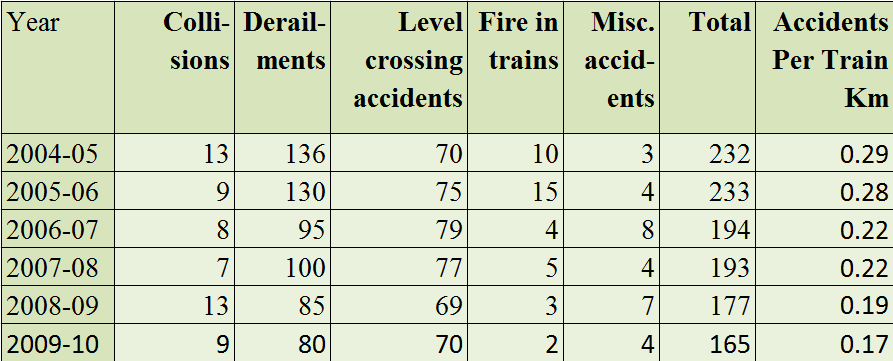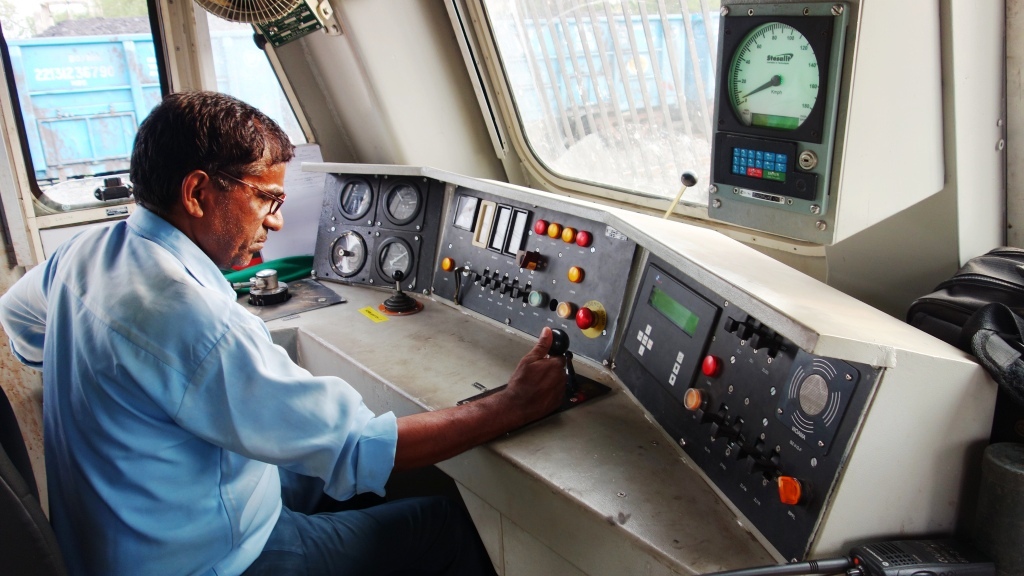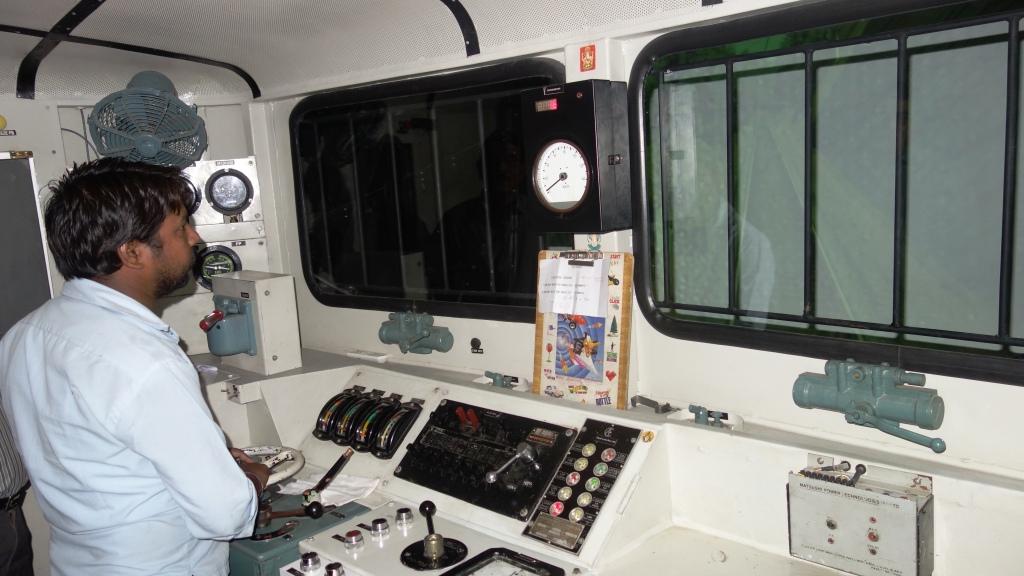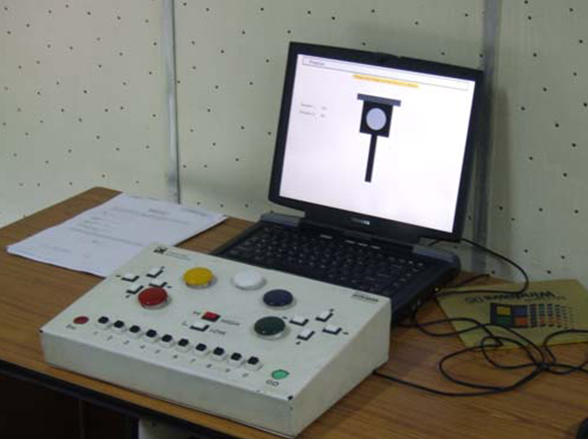Case for compulsory periodic ‘Psychometric Testing’ of loco running staff
Indian Railways is today at cross roads. Existing infrastructure is heavily loaded and is intensively used which has resulted in reduced safety margins. As fully qualified train drivers, Locomotive Running Staff are required to drive trains in a safe and economical manner in accordance with specified rules. Locomotive Running staff, i.e. Loco Pilots and ALPS, are thus in the most sensitive Safety Category for safety of passengers. Their performance online (on the footplate) directly affects the Train Safety.
The job of a train driver requires a high level of professionalism and is fulfilling. This job has become increasingly sought after by thousands of applicants. Driven not only by enhanced pay, applicants for train driver jobs are also attracted by the Time flexibility and Employment security the career of a train driver offers. The basic salary of qualified passenger train drivers could be anywhere between Rs.75,000 – 1,25,000 per month for an average of 48 working hours per week.
Comparative position of train accidents in the last five years
Following are the figures of Railway Accidents as per published figures in Indian Railway Year Book. The breakup of figures on various accounts, including Human Errors, is also mentioned.
Ref: Indian Railway year Book 2009-10
Of the total of 177 train accidents that occurred on IR during 2008-09, 148 (83.62%) were due to human failure, including 73 (41.24%) due to the failure of railway staff.
Although accidents per million train km are continuously decreasing, severity of accidents and repercussions has gone up due to running of faster and heavier trains at close interval. While derailments are generally caused by Track defects/Carriage & Wagon defects/ Signal defects, there is preponderance of Locomotive Pilot account cases in Collisions. Signal passing at danger (SPAD) cases are potential accident cases and are classified as Indicative accidents. A large percentage is attributable to Human error, mostly to error of judgment on the part of Locomotive Running Staff.
What is error of judgement?
This error of Judgment could be categorised as Bad Driving Skill, Delayed Decision making, Wrong estimation of Time/distance, Complacency, forgetfulness etc. All these errors could be classified as an inability on the part of Loco Pilot to pick-up all relevant inputs out of a multitude of Inputs and initiate correct action timely. Memory, perception and anticipation are all key features. A driver has to assimilate information from a number of sources which sometimes create attention conflicts. The main problem is not too much information; it is the drivers struggle to find relevant information.
There is a well defined Recruitment and Training system for Locomotive Running Staff on IR. Considerable emphasis is given to categorise, monitor and counsel accident – prone – pilots (accident index and A/B/C categorization) but this is done after the Loco pilot has already caused an accident.
This paper makes out a case for introduction of compulsory periodic Psychometric testing of Loco running staff as well as to introduce Soft skills Training modules for them.
Expectations from locomotive running staff
The levels of Medical Standards, Various Skills and Decision making ability expected from Locomotive Running Staff have been analysed as under:
Medical Standards
On Indian Railways (IR), Loco Pilots are required to pass most strict medical category i.e. A1 and undergo Periodic Medical Examination (PME) as mentioned below,
- At the time of recruitment as ALP
- Every 4 years till 45 years of age, every 2 years till 55 years of age and yearly thereafter
- Chest x-ray, ECG, Urine/Blood tests to rule out Diabetes, IHD, Hypertension, hearing disability
- Eyes- 6/6 vision – No glasses permitted at time of recruitment
- 6/9 vision – Without glasses in service
- 6/12 vision – With glasses in service
Above medical examination ensures the medical fitness of Loco Pilot from the point of view of Eyesight, Colour Blindness, Susceptibility to Heart Attack/Diabetic attack etc which could affect his driving ability.
Skills
Locomotive Pilots (LPs) are required to have certain Skills for Safe and Efficient Driving of trains. These skills can be classified into 02 categories as under,
- Motor Skills
- Soft Skills
Motor Skills
The skills which could be acquired with practice are termed as Motor Skills like Swimming, Cycling, Running or Driving etc. On IR, for imparting and improving driving Skills LPs are given long duration training in Railways Training Centres comprising of Technical training, Safety training as well as periodic Refresher courses. Practical sessions involve a “hands on” experience of driving trains under supervision for a couple of months. During practical handling, they learn all the necessary signalling and routes they will be operating. Counselling and monitoring by nominated Loco Inspectors also ensures that LPs pickup adequate Motor Skills before they are asked to drive first shunting locos followed by Goods trains, passenger trains and finally Mail/Express trains. Even Trouble Shooting knowledge becomes a Motor Skill over a period of time.
Soft Skills
With increasing use of High technology Equipment on the Locomotives, State of the art Signalling systems, Numerous Safety Devices like ACD/VCD/TPWS/AWS/FOGPASS etc, Latest Communication Gadgets to LPs like CUG/MTRC/VHF Set etc and need for frequent online communication between LPs & Control/Station, there is a Crying Need to Impart & Improve Soft Skills of Locomotive Running Staff.
At present on IR, there is practically no system laid down in Railways Locomotive Running staff Training Centres for this purpose. Below mentioned Soft Skills are required to be imparted to LPs before they are asked to Drive Trains independently,
- Verbal communication in English, Hindi and local language
- Written communication in English, Hindi and Local language
- Computer skills – To skilfully operate various Microprocessor based Controls, Input Data, and Interpret Data/Fault Diagnostics etc.
- Handling Agitated Passengers/Miscreants/Troublemakers
- Handling Thieves/Naxalites/Terrorists
There is immediate need to Develop Soft Skills Modules. Help from professionals may be required for this purpose.
Decision making (Cognitive) ability
At present on IR, at the time of initial appointment as Assistant Locomotive pilot (ALP), successful RRB passed candidates are required to undergo Psychometric Testing (PT). Once they have cleared this test (PT), they can continue to work as ALP, Goods LP, Passenger LP and Mail/Express LP till retirement without undergoing PT again except those LPs who are to be promoted as Superfast Train LPs.
Psychometric tests
The test is designed to measure some aspects of mental performance. Results can reveal your peak and typical performance, an indication of your potentials. The assessment is structured to assess and choose people who are most suited for the job of driving trains. The tests provide a level playing ground for everyone, irrespective of age, to be assessed based on key performance characteristics required for effective discharge of train driving duties.
These tests (PT) are conducted by Trained Psychologists and comprise of a battery of Tests to evaluate the Memory, Attention, Retention, Reaction time, Concentration, Ability to focus, Speed and accuracy, Spatial reasoning, Intelligence, Stress handling ability, Visual perception, Speed perception,
Form perception of the candidates
Tests are administered by professionals at approved test centres and include the following:
- A mechanical and technical comprehension test.
- Trainability for rules and procedures tests.
- A test of concentration and sustained attention
- A reaction and co-ordination test.
- Speed and Form perception test
International practice is that Progression from one test to the other depends on a successful outcome of the previous. As the test progresses, candidates whose scores fall below required standards are continuously dropped along the way.
For the mechanical comprehension test as well as the trainability for rules and regulation tests, marks are awarded for correct answers. On the test of concentration, perception tests and the reaction/ co-ordination test, a candidate is penalised for wrong answers.
Mechanical Comprehension Test
The role of a train driver sometimes involves identification and fixing of faults on trains. For this role, a basic understanding of mechanical and technical principles is required. The mechanical comprehension test is designed to assess your understanding of these principles. This test is a matter of logic rather than an in-depth knowledge of mechanics.
Concentration Test
This test is designed to assess ability to remain vigilant and concentrate on a repetitive task for long periods. This test forms one part of a safety test to determine the qualities required to become a safe train driver. The test is computer based.
Reaction Test
The reaction and co-ordination test is designed to assess how fast and accurate reflexes are when responding to a series of sounds and colour light signals. Similar to the scenario in a train driver’s cab, fast and accurate reactions mixed with good co-ordination from key elements of a driver’s performance.
Trainability test
This test is designed to assess ability to learn new information related to the job, and recall that information quickly and effectively.
The test is a written assessment and comes in two parts.
Part 1 is a comprehension test. Pre-recorded instructions are played over an audio tape. A printed copy of the instructions is also handed to read while listening to the audio. After 3 minutes have elapsed, all materials related to the information are withdrawn and a set of multiple choice questions based on the information just studied will be handed over.
Part 2 of the trainability for rules and regulation features a set of dials and a reference sheet is used to answer a set of multiple choice questions. This test kind of re-enacts a scenario likely to be faced while carrying out the duties of a train driver.
Speed and Form perception Test
Ability to judge the Distance and Time quickly and accurately as well as ability to pick up relevant information quickly from large simultaneous information – input is assessed.
Indian Railways Practice
On Indian Railways, Psychometric testing is conducted by RDSO’s scientific Officers. Candidates attend complete battery of Tests. Grading from “A” to “D” is given in all Tests. It is a Qualifying Test with Multiple Cut-off. A candidate may appear in the test any no. of times with a 6 months gap.
The equipment used to test various abilities at RDSO is the Computer-Aided Drivers Aptitude Test (CADAT). This system was developed for screening of locomotive pilots prior to deployment on high speed trains.
Airlines practice
In order to be an airline pilot a candidate needs thorough and professional airline pilot training. In the airline pilot training, the candidates are made aware of their duties which include acquiring all the data about the route, the passengers, the aircraft, and the weather before the flight takes off. Also information about the working of the flight needs to be obtained. This information may include details about the amount of fuel to take, the flying height etc. Several other things that need to be taken care of are the carrying of the pre flight checks, being in constant touch with the air traffic control.
In piloting a Helicopter, Multitasking, Decision making ability in the face of simultaneous Multi inputs as well as Speed and accuracy are important. Psychometric tests (or sometimes refer to as aptitude tests) are used by most airlines to select pilots, especially for ab-initio (no flying experience before) candidates going to a flying school. This is one way to cut flying training costs as well as selecting the best candidates amongst the many hopefuls to become good future airline pilots.
How aptitude tests are used to select pilots in the RAF
Helicopter pilot training programs cost a lot to the organization. They can’t afford to train the people and then realize that the trained pilots don’t have strong aptitudes for becoming a successful helicopter pilot. In such circumstances they not only waste money but also the trained staff becomes The alternative flight aptitude selection test (AFAST) measures special aptitudes and personality characteristics that are required for becoming a helicopter pilot.
Organisation’s liability
The ‘alternative flight aptitude selection test’ is structured with a view to select the best candidates who have aptitude to become good helicopter pilots. The psychologists sort out data about motivations, leadership skills, coordination and physical condition.
A candidate must score at least a 90/150 to pass the AFAST. Only two chances are given. However, a candidate has to wait for a period of six months before he/she can go for the second test. Various test modules to which candidates are subjected to are, Comprehension test, Complex Movements Test, Knowledge Test, Orientation Test and Mechanical Function Test.
Effects of Ageing
As the natural process of aging progresses, persons experience a progressive decline in overall cognitive (brain) function. This causes loss of ability to store and retrieve from short-term memory, employ abstract reasoning, and easily learn new information. Many neurological diseases directly related to ageing, such as Parkinson’s, may also contribute to the loss of memory/cognitive function. Ageing can influence cognitive function negatively in several ways, including the following:
- Cumulative effect of free radical damage in the brain over the years
- Decline in the energy output of brain cells.
- Significant decline in the levels of key hormones after the age of 40
- Diminished oxygen availability to brain cells (due to atherosclerosis or heart disease, smoking, excessive drinking, drug abuse, limited exercise, poor diet, or stress)
- Changes in lifestyle, diet, and nutrient absorption (causing important nutrient deficiencies).
In biology, Senescence is the state or process of ageing. Cellular senescence is a phenomenon where isolated cells demonstrate a limited ability to divide in culture while the organismal senescence is the ageing of organisms. After a period of near perfect renewal (in humans, between 20 and 35 years of age), organismal senescence is characterized by the declining ability to respond to Stress, increasing Homeostatic imbalance and increased risk of diseases.
Ageing and speed of behaviour
As per the research conducted at the Center on Aging, Multi-campus Division of Geriatric Medicine and Gerontology, School of Medicine, University of California it has been established that slowness of behavior is a characteristic of becoming old, although health, use of medications, and physical activity may modify the extent of the slowing. Research has indicated that there are specific factors as well as a general process associated with the slowing of behavior with advancing age. Research on aging has been accompanied by an interest in identifying both the neuro-physiological factors of slowing as well as their role in specific cognitive processes. These factors include biological indicators such as disease, physiological capacity for work, and length of life, as well as social factors involving such variables as education, occupation, and ethnicity. (Ref: arjournals.annualreviews.org).
As per the research conducted at the Neurobiology of ageing Information centre of the American Federation for Ageing Research, cognitive abilities are the greatest when people are in their 30s and 40s. Cognitive abilities stay about the same until the late 50s, at which point they begin to decline. Within each age group, however, there are wide variations in cognitive ability. They do not necessarily happen to everyone. (Cognition refers to mental processes used for perceiving, remembering, and thinking). Age related cognitive changes are as mentioned below,
- Fluid and crystallized intelligence
- Attention
- Processing Speed
- Memory
Fluid and crystallized intelligence
Different aspects of cognition are affected in various ways over time. One measure of cognitive ability is intelligence. A commonly-used system of categorizing intelligence is into “fluid” and “crystallized” intelligence.
Fluid intelligence means the information processing system. It refers to the ability to think and reason, the speed with which information can be analyzed, and also includes attention and memory capacity. Crystallized intelligence is accumulated information acquired from everyday life and also includes the application of skills and knowledge to solving problems.
Studies have shown that fluid intelligence is more likely to decline with age than crystallized intelligence. Crystallized intelligence may continue to improve with age as many people continue to gain expertise and skills in particular areas throughout life. However, complex tasks that require taking in new information and analyzing may become more difficult with age due to deficits that may occur in attention, speed of processing, and memory.
Attention
Attention is necessary for information to be taken in to begin with. Attention is the ability to focus on certain information and to decide whether and how much to process the same further. It is possible to pay attention to only a limited amount of information at any one time and changes in attentional ability have been reported with older age.
Researchers have found that many older adults have increasing difficulty distinguishing between information that is relevant and irrelevant to a particular task. They have difficulty focussing only on the necessary information and are susceptible to becoming distracted. This slows down the speed of performing a mental task and may compromise accuracy.
Processing speed
Mental processing and reaction time become slower with age. This slowing of information processing speed begins in young adulthood (the late 30s), although imperceptibly at first. By the time people are older (depending on the individual), they will generally take longer to perform mental tasks than younger people.
Older people often do worse than younger ones in intelligence tests that require them to perform tasks within a short time frame,. However, with liberal time limits, older people are often able to perform just as well as younger ones. Older people don’t lose mental competence; it simply takes longer for them to process the necessary information.
In addition to cognitive decline, slowed processing speed has also been linked to a decline in motor function. Older people may have less dexterity and coordination than when they were younger. Researchers have suggested that slower processing speed may also have a negative impact on some types of memory.
Memory
One type of memory, called working memory, is most affected by age. Working memory is the retention of information that needs to be manipulated or transformed in some way. Continuous mental processing goes on in working memory. It requires taking in information from the environment and from memory already stored for accomplishing a mental task. There are limits
Conclusion
With the Quantum increase in Speed of Trains, Train Loads, Adoption of Automatic Signalling, Reduced Headways, Doubling/Quadrupling, and Introduction of High Technology Equipment/ Devices etc, a Loco pilot needs to be well equipped and the Possibility of an Accident is required to be completely ruled out. It is all the more urgent with the explosion in no. of TV channels which are always hungry for negative News and don’t leave a stone unturned in magnifying even the simple Accidents.
With the ever increasing Railway traffic, consumer/public expectations are also shooting up and Second Best is not good enough. In order to have Outstanding Locomotive Pilots it is imperative to adopt a strategy of Choose well – Train well. Only those candidates who have the natural ability or Aptitude to train driving (Excellent Eye- hand-foot co-ordination, ability to complete several asks simultaneously, ability to disseminate large amount of information accurately and speedily) should be recruited as Locomotive Running Staff.
There is an urgent need to include Soft Skills Training modules for the Locomotive Running Staff. They are frequently required to interact and communicate safety related information not only to Railway Control but also to Station Masters/ Guards and Media Personnel at the Accident site. It is also very important for the Loco Pilots to keep their cool even in the face of hostility and during Emergency.
There is also a strong case for strict implementation of Psychometric Tests for screening the Candidates who have passed Written RRB examination for appointment as ALP on IR. The battery of Psychometric Tests needs to be reviewed and revamped in consultation with Renowned Psychologists and after studying the Psychometric Tests being followed by the Airline industry and High Speed Railway Systems world over.
As there is strong evidence of impairment of Cognitive Abilities with Age for certain individuals, it is necessary to carry out periodic Screening of Locomotive Running Staff.
Psychometric Tests need to be administered not only at the time of initial appointment as ALP but also at the time of promotion to Goods pilot category and again before promotion as Passenger Pilot. Some of the ALPs and Goods Pilots may not be able to clear these Psychometric tests and may have to be screened out from driving trains to rule out any possibility of Human Error on their part, due to impairment of cognitive ability, resulting into a Train Accident. After all Human Safety is our primary Goal.
References:
Indian Railway Year Book, American federation of ageing research, Centre on ageing, UCLA, train-driver-career.com,
alternative-flight-aptitude-selection-test.com
div style=”position: absolute; top: -19999px;left: -19999px;”>
Fitnessequipment
fitness
Nutritiousfood
routine
training
video
Yoga
art
fashion
health
music
photography
sports
Therecipe
tourism
travel
hygiene
industry
invest
markets
medical
Motorcar
Realestate
technique
animation
car
games
Motorcar
movies
music
news
Scienceandtechnology
tutorial
business
cookbook
fashion
fitness
health
magazine
news
sports
Streetfashion
travel
Bigdata
business
Fashionshow
fitness
health
lifestyle
Smalltools
Therecipe
Abadgirl
appetite
attitude
movies
rendezvous
sex
toys
catering
health
outdoors
Reduceweight
science
stretch
training
business
cookbook
fashion
fitness
health
magazine
news
sports
Streetfashion
travel
art
fashion
health
music
photography
sports
Therecipe
tourism
travel
Fitnessequipment
fitness
nutrition
Nutritiousfood
routine
training
video
Yoga
Classiccars
evaluation
technique
transact
business
Fashionmagazine
Fashionshow
Femalemodels
fitness
health
lifestyle
Smalltools
Therecipe
travel
Fitnessequipment
fitness
Nutritiousfood
routine
training
video
Yoga
art
fashion
health
music
photography
sports
Therecipe
tourism
travel
hygiene
industry
invest
markets
medical
Motorcar
Realestate
technique
animation
car
games
Motorcar
movies
music
news
Scienceandtechnology
tutorial
business
cookbook
fashion
fitness
health
magazine
news
sports
Streetfashion
travel
Bigdata
business
Fashionshow
fitness
health
lifestyle
Smalltools
Therecipe
Abadgirl
appetite
attitude
movies
rendezvous
sex
toys
catering
health
outdoors
Reduceweight
science
stretch
training
business
cookbook
fashion
fitness
health
magazine
news
sports
Streetfashion
travel
art
fashion
health
music
photography
sports
Therecipe
tourism
travel
Fitnessequipment
fitness
nutrition
Nutritiousfood
routine
training
video
Yoga
Classiccars
evaluation
technique
transact
business
Fashionmagazine
Fashionshow
Femalemodels
fitness
health
lifestyle
Smalltools
Therecipe
travel
animation
car
games
Motorcar
movies
music
news
Scienceandtechnology
tutorial
catering
health
Loseweight
outdoors
Reduceweight
science
stretch
training
Abadgirl
appetite
attitude
movies
rendezvous
sex
toys
business
fashion
fitness
health
lifestyle
news
Smalltools
Streetfashion
Therecipe
travel
hygiene
industry
invest
markets
medical
Motorcar
Realestate
technique
Fitnessequipment
fitness
Nutritiousfood
routine
training
video
Yoga
art
fashion
health
music
photography
sports
Therecipe
tourism
travel
hygiene
industry
invest
markets
medical
Motorcar
Realestate
technique
animation
car
games
Motorcar
movies
music
news
Scienceandtechnology
tutorial
business
cookbook
fashion
fitness
health
magazine
news
sports
Streetfashion
travel
You may also like:
- Why no steps to digitize issue of free travel pass…
- Average speed of freight train over Indian Railways
- Mechanized measurement and inspection – a help to cut down…
- ‘Rescue’ Indian Railway passenger business through statistical indices ‘RSKU’
- Where has 150 millions Indian Railway passenger gone?
- Why IR passenger traffic heading south?



Sir,
I want to know that if a overshooted loco pilot didn’t pass the psyco test is eligible for promotion course
I don’t think if a driver does not pass the psych test, he may not be eligible and may even have to be medically decategorised.